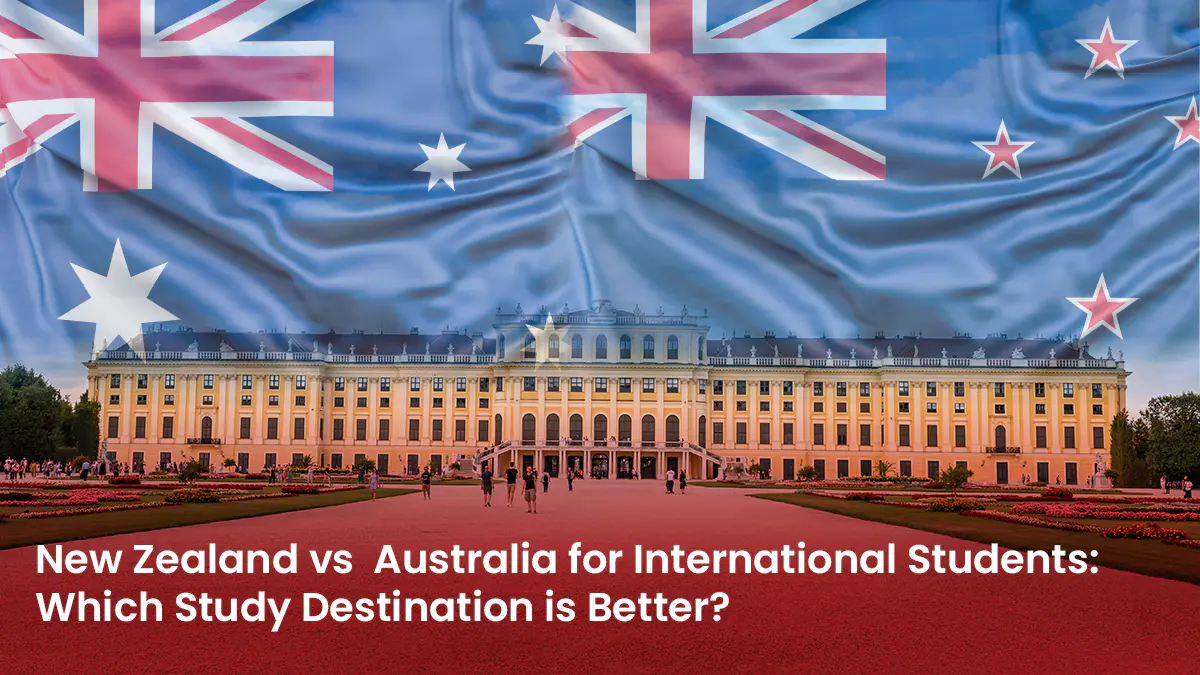Any aspirational student intending to pursue higher education overseas must select the right study abroad destination. If you are one of them and have narrowed down your research to New Zealand and Australia as your destination and want to finalize one, we want to tell you that you have excellent research skills and have chosen the most sought-after options.
New Zealand offers excellent work-life balance and some of the most reasonably priced university possibilities. Australia is home to some of the world’s best universities and enjoys a stellar reputation in the academic community. Both countries have their unique characteristics. However, to make a wise intellectual investment, international students must consider several factors.
In this comprehensive guide, we will take a closer look and compare both countries to assist you in making a wise choice.
Australia vs. New Zealand: Country highlights
| Factors of Difference | New Zealand | Australia |
| Capital | Wellington | Canberra |
| Currency | New Zealand Dollar (NZD) | Australian Dollar (AUD) |
| Higher Education Institutions | ITPs | PTEs | New Zealand Universities | VET | Australian Universities |
| Average annual cost of studying | Undergraduate: NZD 22,000 – NZD 32,000
Postgraduate: NZD 26,000 – NZD 37,000 Doctoral: NZD 6,500 – NZD 9,500 |
Undergraduate: AUD 20,000 – AUD 45,000
Postgraduate: AUD 22,000 – AUD 50,000 Doctoral: AUD 18,000 – AUD 42,000 |
| Top courses | Engineering, Hospitality, Business Management, Medicine, Agriculture and more | Biomedical engineering, Hospitality & Tourism, Architecture, Agriculture and more |
| Average annual cost of living | NZD 21,000 – NZD 25,000 | AUD 23,000 |
| Part-time work hours for students | 20 hours a week | 48 hours in two weeks |
| Popular job sectors | Education, Medicine, Agriculture, Finance & Business, Engineering, etc. | Healthcare, Education, Construction & Architecture, etc. |
New Zealand vs. Australia for international students: Best universities
Whether you choose to study in Australia or study in New Zealand, both countries boast a roster of QS-ranked universities. These universities offer you the best academic experiences and promise great career prospects. Skim through this table to know which are the best universities in New Zealand and Australia that you can consider.
| New Zealand | Australia | ||
| University name | QS World University Rankings 2024 | University name | QS World University Rankings 2024 |
| The University of Auckland | 68 | Australian National University | 34 |
| University of Otago | 206 | The University of Melbourne | 14 |
| Victoria University of Wellington | 241 | The University of Sydney | 19 |
| University of Canterbury | 256 | The University of South Wales | 19 |
| Massey University | 239 | The University of Queensland | 43 |
| Monash University | 42 | ||
| Australian National University | 34 | ||
New Zealand Vs Australia for international students: Top courses
Thinking about Australia vs. New Zealand, which country is better in terms of courses? Here’s your answer.
Australia is an ideal location if you intend to pursue courses such as Medicine, Computer Science, Education, MBA, Healthcare Hotel Management, Information Technology, and Engineering. New Zealand is the right location if you intend to pursue courses like Business IT or Computing, Hotel Management, Healthcare, etc.
Students can choose their study abroad destination based on their study style. The majority of universities in both universities follow the two-semester schedule. Only some universities in Australia follow the three-semester pattern.
Australia vs. New Zealand for international students: Admission requirements
Below is a standard criteria list that all universities adhere to. You must visit the university website for exact requirements, as sometimes the requirements vary based on the course and country.
| Australia | New Zealand |
| 1. Application form
2. All academic copies, such as marksheets, completion certificates, etc. 3. 60% or above in high school 4. Bachelor’s degree if you are applying for postgraduate courses 5. Passport 6. CV or Resume 7. Personal statement 8. GMAT/GRE scores for postgraduate courses 9. IELTS or TOEFL |
1. Application form
2. All academic copies, such as marksheets, completion certificates, etc. 3. 70% or above in high school 4. Bachelor’s degree if you are applying for postgraduate courses 5. Passport 6. CV or Resume 7. Personal statement 8. GMAT/GRE scores for postgraduate courses 9. IELTS or TOEFL |
New Zealand vs. Australia for Indian students: Cultural differences
From a cultural perspective, you may have an exhilarating experience in New Zealand. You will witness natural surroundings and stunning landscapes in the country. Whereas Australia’s culture is a blend of Western Anglo and Aborigine. While in Australia, you will have a happy time connecting with warm and welcoming people who love a fun and relaxed life.
New Zealand vs. Australia: Scholarships
Both countries offer a wide range of scholarships for international students. Some of them are listed below.
Australian scholarships
- University-specific Scholarships: These are offered on the basis of academic merit or specific programs.
- Country-specific Scholarships: Students belonging to specific countries can avail of these scholarships.
- Endeavour Scholarships and Fellowships: These are offered to high-achieving researchers and international students to push them to study and conduct research in Australia.
- Research Scholarships: These are for students who want to pursue a research degree in Australia.
New Zealand scholarships
- Country-specific Scholarships: Students belonging to specific countries can avail of this scholarship.
- Research Scholarships: These are for students who want to pursue a research degree in New Zealand.
- New Zealand Scholarships: These scholarships are funded by the New Zealand government and cover tuition fees, living costs, and other expenses.
- University Scholarships: Based on academic achievements and study programs, some New Zealand universities offer scholarships to international students.
Please note: To secure financial assistance for your study abroad plans, research and apply for the scholarships before the scholarship application deadlines.
New Zealand vs. Australia: Total cost for international students
The table below provides an average cost of living and the difference in tuition fees in both countries. The cost may vary depending on the duration of the course and lifestyle.
| Expense type | New Zealand | Australia |
| Cost of studying | NZD 21, 450 to NZD 9,70,000 per annum | AUD 5,000 to AUD 2,70,000 per annum |
| Cost of living | NZD 16,100 to NZD 5,35,000 per annum | AUD 10,000 to AUD 5,40,000 per annum |
New Zealand Vs. Australia: Student visas
To study in Australia or New Zealand, you must acquire a student’s visa, a crucial document issued by the government to grant international students the legal right to reside and study there. Here’s a general difference between the cost and validity of student visas in both countries.
| New Zealand | Australia | |
| Cost of the visa | The cost of the visa ranges between NZD 328 and NZD 330 | The cost of the visa ranges between AUD 650 and AUD 670 |
| Validity of the visa | The validity of the visa is 12 months | The validity of the visa is 10 months |
Post-study work visa
You must apply for a post-study work visa before actually applying for a job. The post study work visas provide a smooth transition into the workforce market and open doors to an exciting career in these countries. You’ll have more options, more exposure, and more employment opportunities in the study-abroad destination.
New Zealand’s post-study work visa
- If you have studied in the country, you are eligible to apply for the PSWV.
- The processing time for this visa is 42 days.
- With PSWV, you can work for three years.
Australia’s post-study work visa
- The processing time for this visa is 79 days.
- With the PSWV, you can work in Australia for up to two to four years.
Choosing the best study abroad location is a career choice no one would want to take a risk with. But, with the right knowledge and information, you can make an informed choice. Both countries, New Zealand and Australia, provide international students with excellent academic and life experiences and a wealth of services. It is recommended to connect with study abroad consultants to help you make better choices, keeping your aspirations in mind.



























